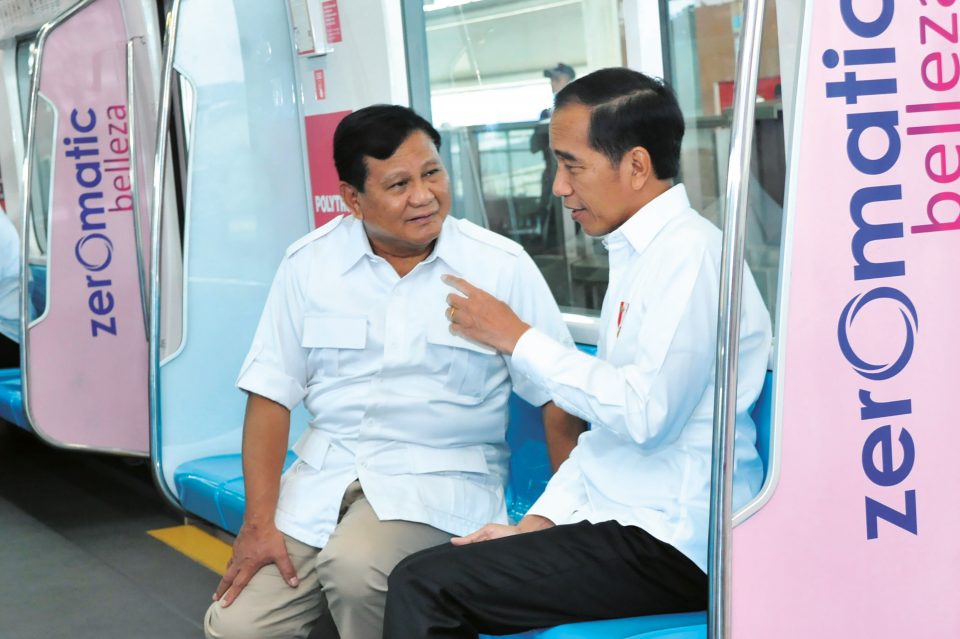To Western observers raised in societies which thrive on oppositional politics it all seemed too weird.
Joko Widodo, the just re-elected president of the world’s third-largest democracy was pictured sitting in an MRT (Mass Rapid Transport) carriage. Alongside him; Prabowo Subianto, the man whose utterances on the hustings had led many to fear he wanted to unravel democracy. For some, the scene was incomprehensible.
Hard to imagine a similar setting with Donald Trump and Nancy Pelosi exchanging pleasantries on a New York subway, or Theresa May and Jeremy Corbyn amicably chatting on the London tube.
The two rivals sharing a public transport system bench in a staged gesture of reconciliation will hopefully bring social stability and invigorate business. Smart politics for those satisfied by the superficial, but it was also exquisitely Javanese.
That’s because the culture prizes harmony above confrontation, according to the late US anthropologist Clifford Geertz. “Yes” and “No” responses are too blunt and don’t always carry the meaning accepted elsewhere, which is why the President’s pronouncements are often misunderstood.
When asked last year whether Australia should join ASEAN (the Association of Southeast Asian Nations) Widodo used a favourite phrase: “I think it’s a good idea.” This was interpreted as the Republic wanting its southern neighbour to enter the ten-member alliance.
Aaron Connelly, research fellow at Australia’s Lowy Institute tweeted: “Reality check: Australia has not been invited to join ASEAN, and will not be invited to join ASEAN in our lifetimes. Jokowi was offering a Javanese response, trying to be polite.”
Another Widodo reply that perplexes aliens is: “Why not?” – most recently used in response to a question about appointing younger people to Cabinet. The corollary is “Why?”
Although Geertz’s doctoral studies were conducted in the 1950s, Religion in Java remains one of the most authoritative books on the values of the citizens of the world’s most populous island. It’s also a great tool for expats trying to get a handle on their new posting.
Also, worth remembering, more than 60 percent of Indonesians are Javanese. Numerically, financially, academically, and culturally they dominate Indonesian politics and business. The power mainly resides in West Java. Central Java is about culture and East Java is industry.
Nor should the Javanese be seen as homogenous. Geertz defined three aliran or streams in the ethnic group’s religious structure: the orthodox Santri, the Abangan which mix Islam with animism and Hindu traditions, and the Priyayi nobility. Although some academics have disputed this analysis, it remains a classic in social studies.
News reports of the 20-minute MRT journey said Subianto and Widodo, both in white shirts for the tailored occasion, were now “best friends and brothers;” the bitterness of the election contest had been blown away by a zephyr of goodwill and would not persist like the Jakartan smog.
To those who prefer symbols to words, the splendidly choreographed commute, equal to the West Side Story Jets and Sharks makeup scene, concluded with a meal of sate; in the background a display of punakawan shadow puppets symbolising friendship.
All this left many outsiders shaking their heads in disbelief. The slanders and threats delivered during the campaign by both sides were so intense and prolonged that true pacification will take years.
When asked why he had not congratulated the winner for three months, Subianto reportedly used a Javanese excuse: “I have to follow ewuh pakewuh (the culture of feeling uncomfortable) manners, a congratulation should be conveyed face to face.”
The Javanese may make gestures of forgiveness, but they seldom forget, said Geertz. A much-circulated slur had the President labelled a communist, Chinese and Christian, a triple-curse in a country where the majority are Muslim.
The fact that Widodo was four years old when the 1965 coup against the Communist Party erupted seemed to bother few, while the idea that a former slum kid with classical Javanese features might be Chinese is asinine.
Such malice must have wounded deeply, particularly as all accounts of Widodo’s past in the Central Javanese city of Solo reveal an Abangan Muslim. Ironically, his opponent’s mum, the late Dora Marie Sigar, was raised as a Christian in North Sulawesi.
Subianto refused to accept the election result which gave Widodo the win by ten percentage points. Nine people reportedly died and hundreds were injured when the loser’s supporters demonstrated violently in Jakarta in late May. When these tactics didn’t change the result, Subianto went to the Constitutional Court with thousands of documents alleging systematic fraud. The justices were unconvinced.
Some claim the MRT meeting means the former general may now have accepted that the electoral process was fair and balanced; that most voters want Widodo to lead them for the next five years, and that the former general has swallowed his pride. That final assumption may be hasty.
Western democracies trash bad losers. However, Subianto’s outrage at being unhorsed by a motorcycling commoner was needled by more than his Priyayi aristocratic family’s dynastic expectations; his father, economist Sumitro Djojohadikusumo (1917 – 2001), was one of the nation’s founders. The other factor was Javanese spiritual beliefs.
This is another trait puzzling and confusing to foreigners: how can sophisticated and Western educated Indonesians like Subianto, who spent three years at the American School in London, also accept supernatural omens and mysticism? In the Gerindra Party leader’s case, an ancient paranormal’s prediction collided with the reality of a modern vote count.
The 12th century Javanese seer Joyoboyo forecast that the island would eventually be led to greatness by Ratu Adil, the Just King. Second President Soeharto assumed he was the chosen one, but Subianto has long been encouraged by his admirers to assume he deserves the mantle.
So far, the augury has failed, but there’s another election scheduled for 2024 when Subianto will be 72. Will he contest again? Why not?




